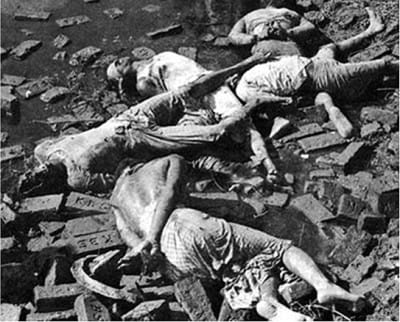Govt to seek evidence from Pakistan, US

Photo: File Photo
The United Nations (UN) has named four international war crime experts to assist Bangladesh in the trials of war criminals of 1971, responding to a request of the government, officials said.
The government has also taken initiatives to ask Pakistan and the US which supported Pakistan during the Liberation War, to provide Bangladesh with particular war related documents and evidence for the trial. The requests are being made under the International Crimes (Tribunal) Act 1973.
Pakistan in particular will be requested to send information regarding the Razakras (the collaborators of the erstwhile Pakistani occupation forces in Bangladesh), said the officials.
"We are going to request all, including Pakistan and the United States to provide documents and evidence relating to the genocide committed during the liberation war and about those who were involved in war crimes," State Minister for Liberation War Affairs ABM Tajul Islam told The Daily Star yesterday.
He said although the evidence and documents Bangladesh already has, are enough to try the war criminals, more documents and evidence are required to make the trials acceptable worldwide.
The names of the four transitional justice experts sent by the local office of the United Nations Development Programme (UNDP) are Louis Bickford who is a political scientist and a member of the International Centre for Transitional Justice (ICTJ), Priscilla Hayner who is a co-founder of ICTJ, Bogdan Ivanisevic who is a Belgrade based consultant for ICTJ, and Alexander Mayer-Rieckh who is the head of ICTJ's security sector reform programme. Alexander Mayer-Rieckh was also the chief of the human rights office of the UN mission in Bosnia and Herzegovina, and worked in Rwanda, Ethiopia, Eritrea, and East Timor. The names were sent to the law ministry.
Earlier on Sunday, UNDP Resident Coordinator Renata Lok Dessallien offered Bangladesh international experts while discussing the issue of investigation, prosecution and trials of the 1971 war criminals under the provisions of the International Crimes (Tribunal) Act 1973, during a meeting with Law Minister Shafique Ahmed in Bangladesh Secretariat.
In a letter sent to Renata yesterday the law ministry appreciated the UN offer and sought all necessary assistance regarding the trials.
"The government deeply appreciates such offers and requests you to be so good as to provide such assistance so that the trial can be held in a proper manner and in conformity with domestic laws as well as international standards," reads the letter, signed by Law Secretary Kazi Habibul Awal.
Back in January, Renata wrote to the law minister suggesting the government to invite some renowned experts in the field of war crime proceedings and truth commissions to share lessons and experiences from around the world.
"This will help the government to learn from experiences elsewhere and to avoid possible costly mistakes," the letter read, which reiterated UNDP's commitment to supporting the government in the vital areas of development and governance.
Sources in the law and liberation war affairs ministries said Pakistan will be asked to send documents and evidence following an inter-ministerial meeting scheduled to be held at the home ministry tomorrow.
"The Pakistani government will also be asked to provide us with the names of those who had collaborated with the Pakistani occupation forces in 1971," an official of the liberation war affairs ministry told The Daily Star.
"With the request letter, Bangladesh will provide some documents, including a 1971 official gazette of the erstwhile Pakistan that recognised the Razakras as an auxiliary force of the Pakistani occupying army," he said. The gazette was signed by the then cabinet secretary Ghulam Ishaq Khan, in September 1971.
The process of trying the war criminals will formally kick off tomorrow with the appointment of a chief investigation officer and formation of an investigation agency to probe the atrocities committed during the liberation war of Bangladesh.
State Minister for Law Qamrul Islam told The Daily Star yesterday that the modus operandi of the UN help will be fixed soon since there is no obstacle to trying the war criminals.
A resolution was passed in the parliament in January for trying the war criminals. The government also prepared a list of suspected war criminals and warned the law enforcement agencies so that they may not flee the country.
Asked about the suspects, Tajul Islam said, "I can't tell you the number. What I can tell you is that the number of suspects will be quite large."
He said the government will do everything to make the trials transparent and fair. "If needed observers from the UN and European Union (EU) will be allowed to be present at the trials."
There are a total of 1,779 war criminals, including 369 members of the then Pakistan armed forces, according to an official document.
Some 30 lakh civilians were killed by the erstwhile Pakistani occupying forces and their collaborators in 1971 during Bangladesh's war of independence, while about 2,00,000 women were raped, and tens of thousands of homes were torched and plundered.
Earlier, an initiative to prosecute war criminals was called off after the 1975 bloody regime change following the assassination of Bangabandhu Sheikh Mujibur Rahman and most of his family.
Bangladesh Sector Commanders' Forum, a group of 1971 war veterans, last year revealed that 11,000 indicted war criminals were released from jail a few months after the August 15, 1975 assassination of Bangabanadhu, the architect of Bangladesh's independence.

 For all latest news, follow The Daily Star's Google News channel.
For all latest news, follow The Daily Star's Google News channel. 



Comments